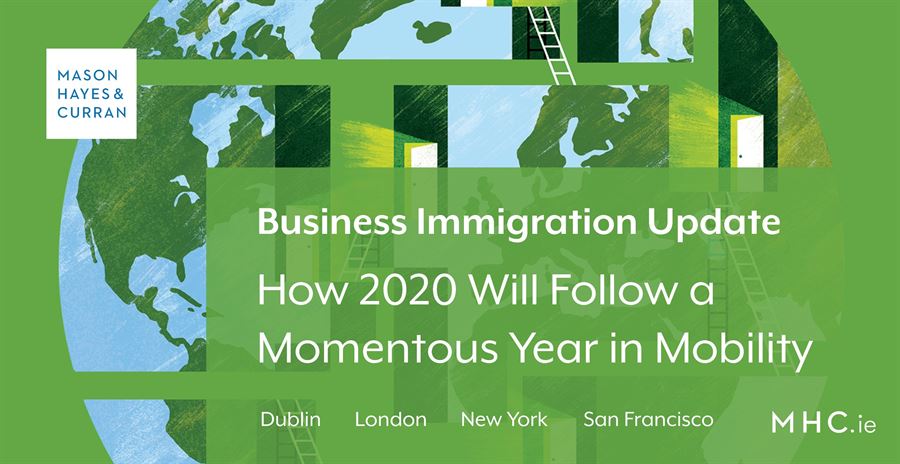Business Immigration: How 2020 Will Follow a Momentous Year in Mobility

From securing the Common Travel Area between Britain and Ireland despite Brexit, to another building boom demanding more construction workers and a cessation of citizenship ceremonies, it has been a feverish year of activity. We summarise the main developments which defined the business immigration landscape in 2019 and look to what is on the horizon in 2020.
Memorandum of Understanding secured the Common Travel Area between Britain and Ireland
By signing a Memorandum of Understanding, the British and Irish governments guaranteed not only the free movement of citizens between the two countries but also the reciprocal benefits of access to social security, health and education.
The Memorandum reaffirmed the special status Ireland will have with the UK compared to other EU countries in any Brexit arrangement.
Accessing the labour market made easy for spouses/partners of Critical Skills Employment Permit (CSEP) holders
A welcome change to the permit system earlier this year means that spouses and partners of CSEP holders no longer need an employment permit to work in Ireland. On arrival in the State, eligible spouses and de facto partners are granted immigration permission with a right to work. In addition, a pre-clearance procedure introduced by the Irish Government has further simplified the visa process for spouses/partners of foreign nationals who hold a CSEP.
Brexit and building sector drove softening of employment permit scheme
New employment permits regulations came into existence which broadened the eligible construction-related occupations and ensured that there were enough workers to manage the logistical workload arising from Brexit. The regulations included additions to the Critical Skills Occupations List and deletions from the Ineligible Lists of Occupations resulting in an overall relaxing of the employment permit rules.
Citizenship ceremonies put on hold pending a Court of Appeal ruling
Before the summer recess, a High Court decision caused major disruption to the citizenship system in Ireland. Mr Justice Max Barrett ruled that the ‘continuous residence’ requirement in citizenship applications means an applicant for naturalisation must have ‘unbroken’ residence in Ireland for an entire year immediately before the date of their application. He held that the word ‘continuous’ was to be given the literal meaning and breaks were not allowed. This is an outcome which neither party to the case foresaw or desired.
An appeal was filed and received an emergency hearing date which resulted in a finding by the Court of Appeal that the discretion exercised by the Minister, whereby absences up to six weeks in duration are accepted, was considered reasonable.
What’s in store in 2020 for business immigration
Employment Permits (Consolidation and Amendment) Bill 2019
A new Bill which will consolidate the existing legislation surrounding this complex area was published in November 2019. It is hoped that it will come into effect in 2020 and bring with it improved transparency of the regulatory processes.
As part of the Bill, the Minister for Business, Enterprise and Innovation intends to introduce a seasonal employment permit; provide for an extensive revision of the Labour Market Needs Test; and introduce a Special Circumstances Employment Permit, which will cater to a number of instances including bilateral reciprocal agreements with other States. We will bring our readers more information as the legislation is enacted.
Changes to Critical Skills Employment Permit and Labour Market Needs Test
From 1 January 2020 the minimum annual salary for a CSEP Permit will increase from €30,000 to €32,000 for roles on the Highly Skilled Occupations List and from €60,000 to €64,000 in all other cases. For CSEP Permit applications submitted up to and including 3 December 2019, there is no change to the minimum remuneration thresholds.
In addition in the new year, the requirement to undertake a Labour Market Needs Test within Ireland and across the EEA will increase from two weeks to four weeks duration.
Immigrant Investor Programme
We saw interest in the Immigrant Investor Programme (IIP) increase significantly during 2019 as a consequence of dynamic business professionals recognizing the advantages both personally and professionally of maintaining a foothold in Europe. The IIP allows non-EEA nationals and their families, who commit to an approved investment, acquire secure residency status in Ireland.
The IIP offers four investment options, which start from €400,000, to investors of good character with a minimum net worth of €2 million. The applicant investor may apply for residency for themselves and their spouse/civil partner and dependent children.
We guided a number of applicant investors through the process in the last quarter of 2019 and expect to see continued increase in the uptake of residence through the IIP in 2020.
Summary
Ireland is continuing to make practical preparations for Brexit and our economic migration policy remains accommodating to the arrival of non-EEA nationals to fill gaps in the domestic economy.
Over the last year, we have witnessed the Irish Government’s commitment to driving strategies to attract and retain highly skilled foreign nationals, making it easier for companies based in Ireland to fill key roles.
This increased number of foreign nationals in the State will continue to benefit the country greatly by providing a highly skilled and diverse workforce. These individuals are contributing to increased competitiveness in the workforce, expansion in the growth potential of our economy and increasing cultural and social development.
The policies and rules surrounding the permit system are ever-changing as market needs change. Both unexpected changes and welcome developments show what a mercurial area of law business immigration can be.
For more information on issues related to mobility that may potentially affect your organisation in 2020, contact a member of our Business Immigration team.
The content of this article is provided for information purposes only and does not constitute legal or other advice.
Share this:


